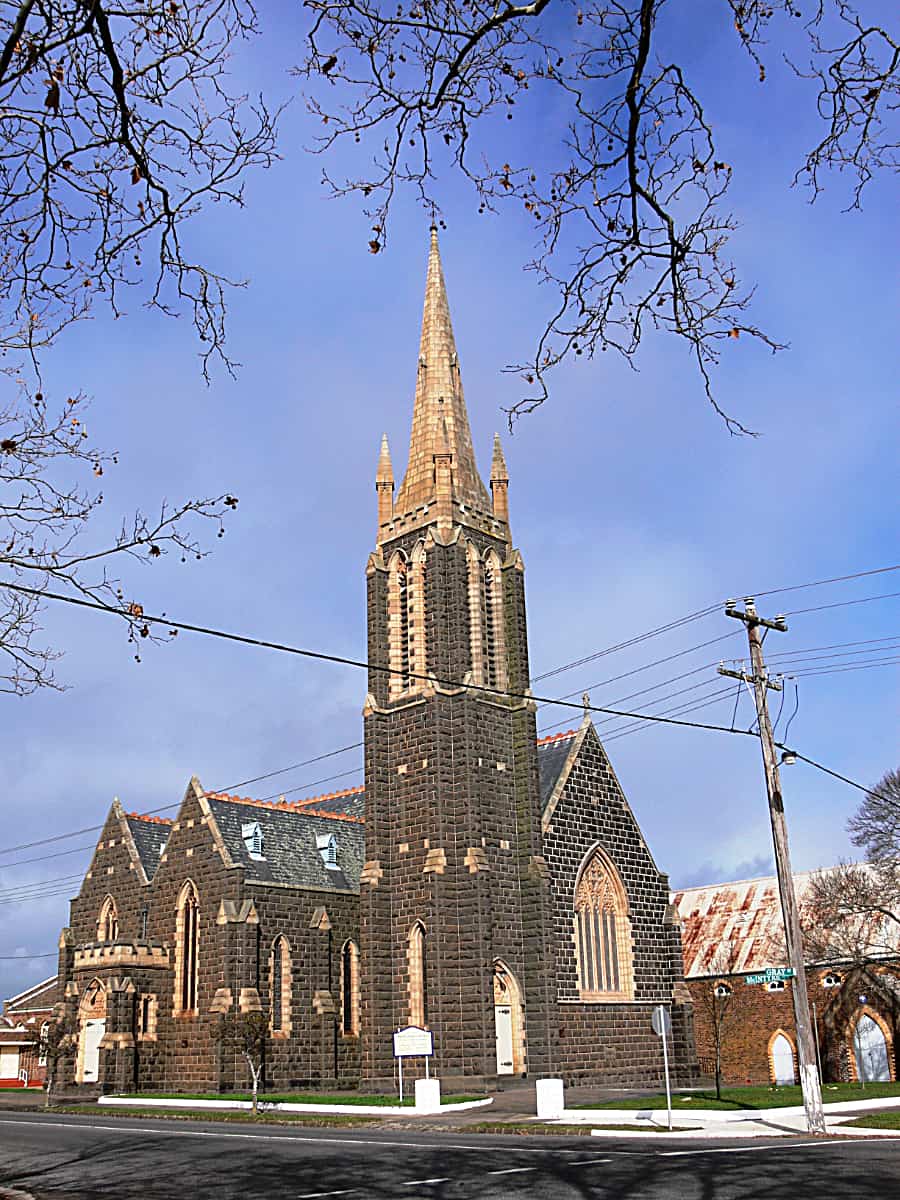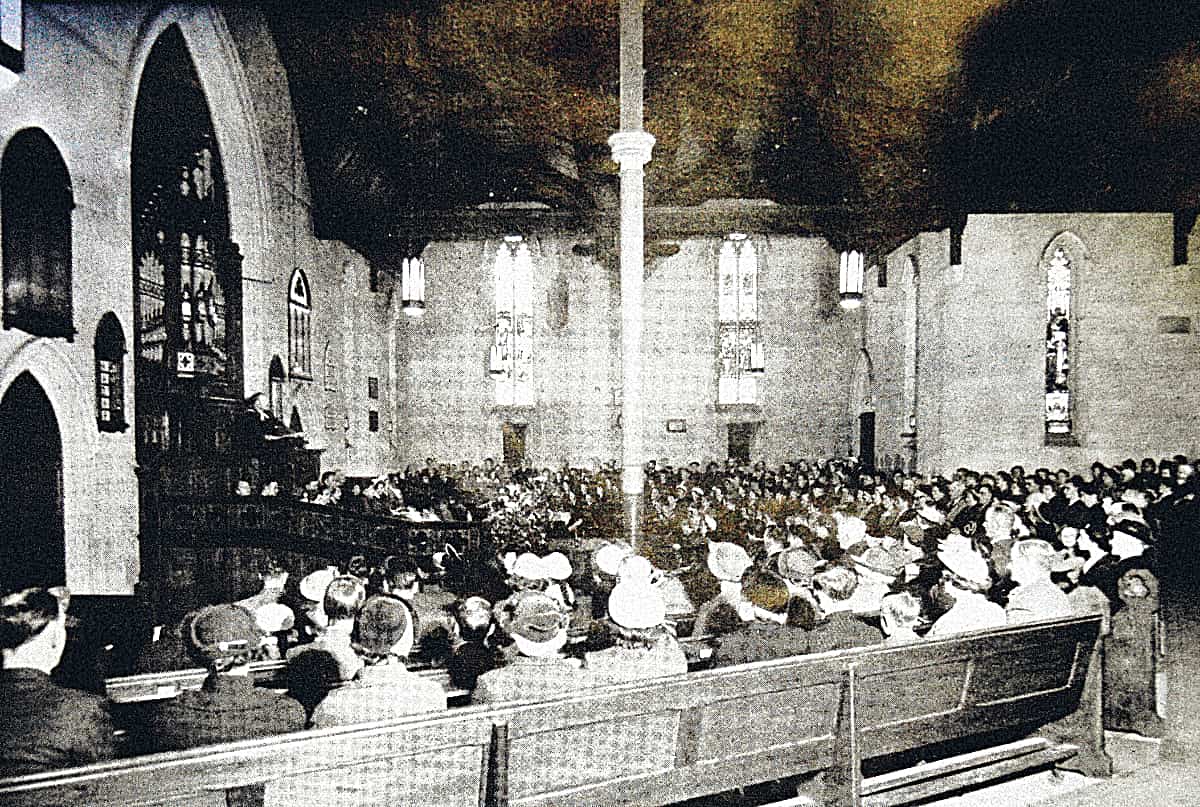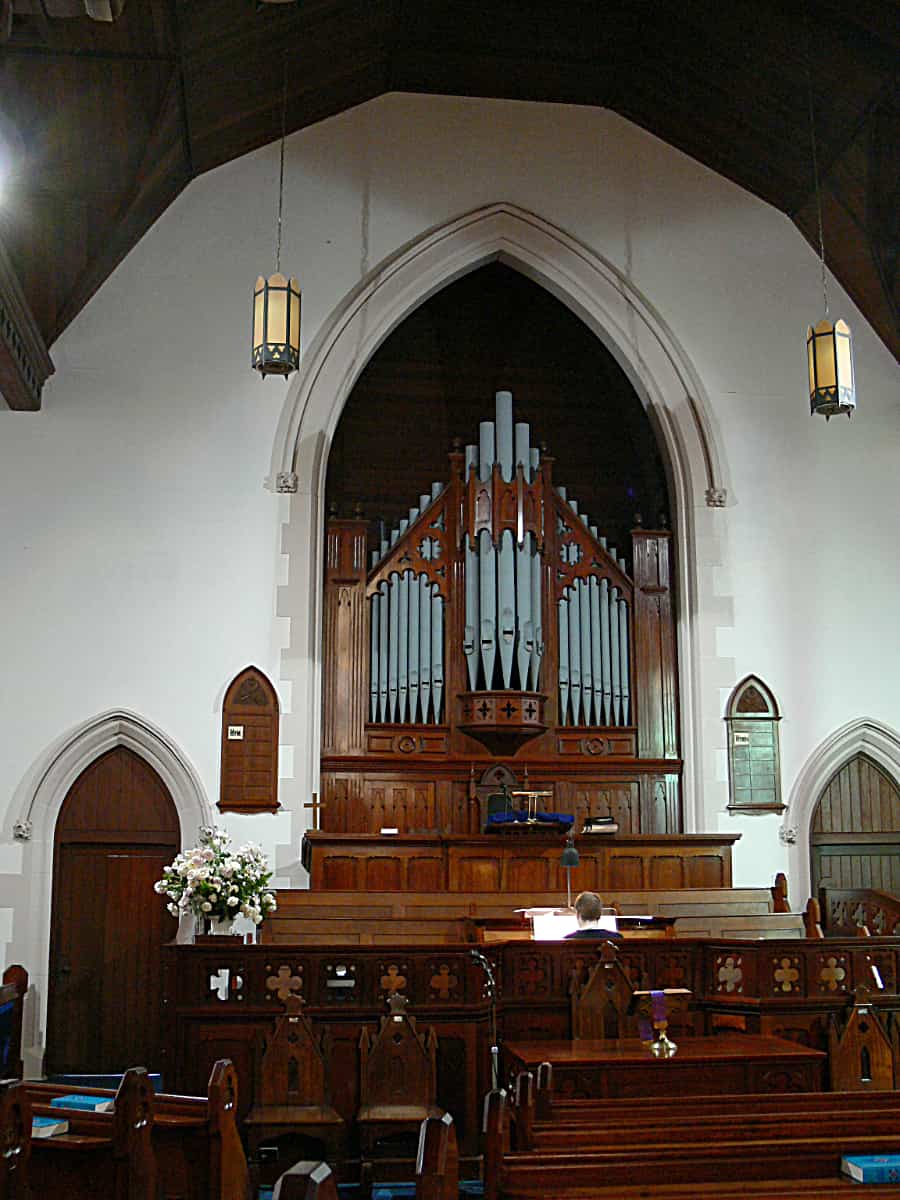
St Andrew’s Presbyterian Church, Hamilton – exterior
(photograph by John Maidment [24 May 2006])
Historical and Technical Documentation by John Maidment
© OHTA, January 2022

St Andrew’s Presbyterian Church, Hamilton – exterior
(photograph by John Maidment [24 May 2006])
Historical and Technical Documentation by John Maidment
© OHTA, January 2022
The site of the church was granted in 1854. The first church was opened in 1858 and was enlarged in 1877.

St Andrew’s Presbyterian Church, Hamilton – interior showing organ with stencilled pipes
(early photograph from the Uniting Church Archives [2006])
The present church was opened in June 1909. It was designed by prominent Ballarat architect George William Clegg (born 1870) and the builder was E. Tuxen. Built in bluestone, it has a prominent tower and spire (at 130 feet, the tallest of the three in Hamilton, with elongated belfry stage and corner pinnacles). The nave has double transepts, a raking floor and interior focussing on choir and organ. The transept roofs are supported internally on stencilled iron columns. The porches have tiled floors. The windows have sandstone dressings and carved bosses. Cost was not spared in producing a superbly finished and detailed building.
Fittings include superbly polished blackwood pews, the font and a side table (at the rear of the church) with cherub heads - these are likely to have been carved by Robert Prenzel, the renowned wood carver, who also did work in the area at Christ Church and St Michael’s, Tarrington. The building contains an extensive collection of stained glass. The earliest ornamental glass probably by William Montgomery (1850-1927) in the style of Ferguson & Urie who were no longer in business by 1908. The use of scrolls with texts is typical of Presbyterian requirements.1
The first organ was built by Bevington & Sons 1845, installed in 1896 and is now in the Lady Chapel of Holy Trinity Anglican Cathedral, Wangaratta. The present organ was built by George Fincham & Son and opened in June 1909 by W.F.G. Steele, organist of The Scots Church, Melbourne, who was also responsible for its design.2
The 1909 specification follows:
| GREAT Open Diapason Stopped Diapason Wald Flute Dulciana Principal Suabe Flute Fifteenth Trumpet Swell to Great |
8 8 8 8 4 4 2 8 |
||
| SWELL Double Diapason Open Diapason Lieblich Gedact Gamba Voix Celeste Gemshorn Piccolo Cornopean Oboe Tremulant Super Octave |
16 8 8 8 8 4 2 8 8 |
||
| PEDAL Acoustic Quint Bourdon Bass Flute Great to Pedal Swell to Pedal |
32 16 8 |
A A A |
3 composition pedals to Great
3 composition pedals to Swell
Balanced swell pedal
Mechanical action to manuals
Tubular-pneumatic action to pedal
Detached drawstop console3

St Andrew’s Presbyterian Church, Hamilton – organ case
(photograph by John Maidment [24 May 2006])
The organ was rebuilt and enlarged in 1965 by George Fincham & Sons Pty Ltd. The façade pipes were originally stencilled but this was painted out at the time of the rebuilding which saw the original mechanical action converted to electro-pneumatic and a new detached console installed together with numerous tonal additions.
| GREAT Contra Salicional Open Diapason Salicional Stopped Diapason Wald Flute Dulciana Principal Suabe Flute Twelfth Fifteenth Mixture 19.22.26 Trumpet Swell to Great Sub Swell to Great Swell to Great Super |
16 8 8 8 8 8 4 4 2-2/3 2 III 8 |
A new A new new B |
|
| SWELL Open Diapason Lieblich Gedeckt Viola da Gamba Voix Celeste Gemshorn Nazard Piccolo Mixture 19.22.26 Cornopean Oboe Tremulant Sub Octave Unison Off Super Octave |
8 8 8 8 4 2-2/3 2 III 8 8 |
TC new B |
|
| PEDAL Acoustic Bass Sub Bass Violone Bourdon Cello Bass Flute Octave Quint Viola Cornet 12.15.17.19.22 Great to Pedal Great to Pedal Super Swell to Pedal |
32 16 16 16 8 8 5-1/3 4 V |
C new C A [ex Swell Double Diapason 16?] A C C A new, partly derived |
Compass: 61/30
Electro-pneumatic action
Detached stopkey console4
1 From notes for a tour ‘Hamilton Churches and Organs’, 28 April 2012, researched by John Maidment
2 Hamilton Spectator, 7 June 1909, p.3
3 Specification from E.N. Matthews, Colonial Organs and Organbuilders (Carlton: Melbourne University Press, 1969), p.218 with corrected nomenclature
4 Specification noted John Maidment 1966